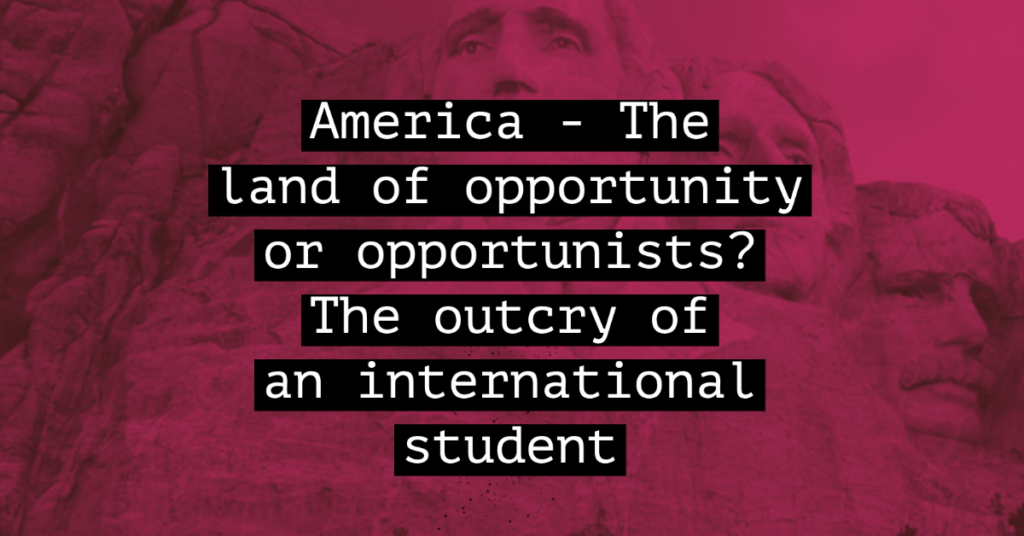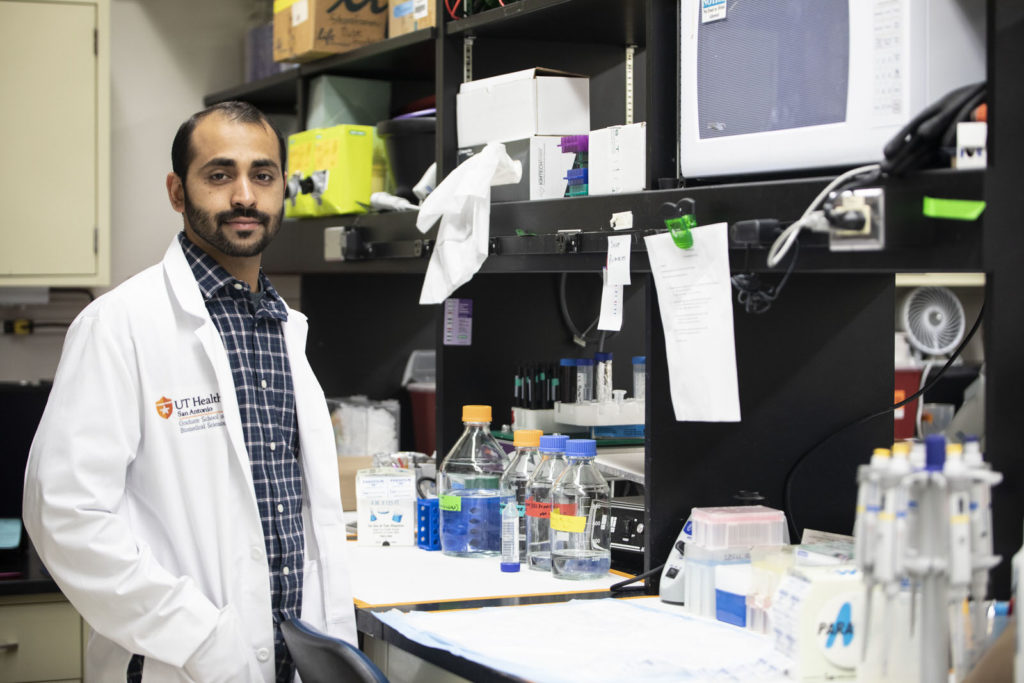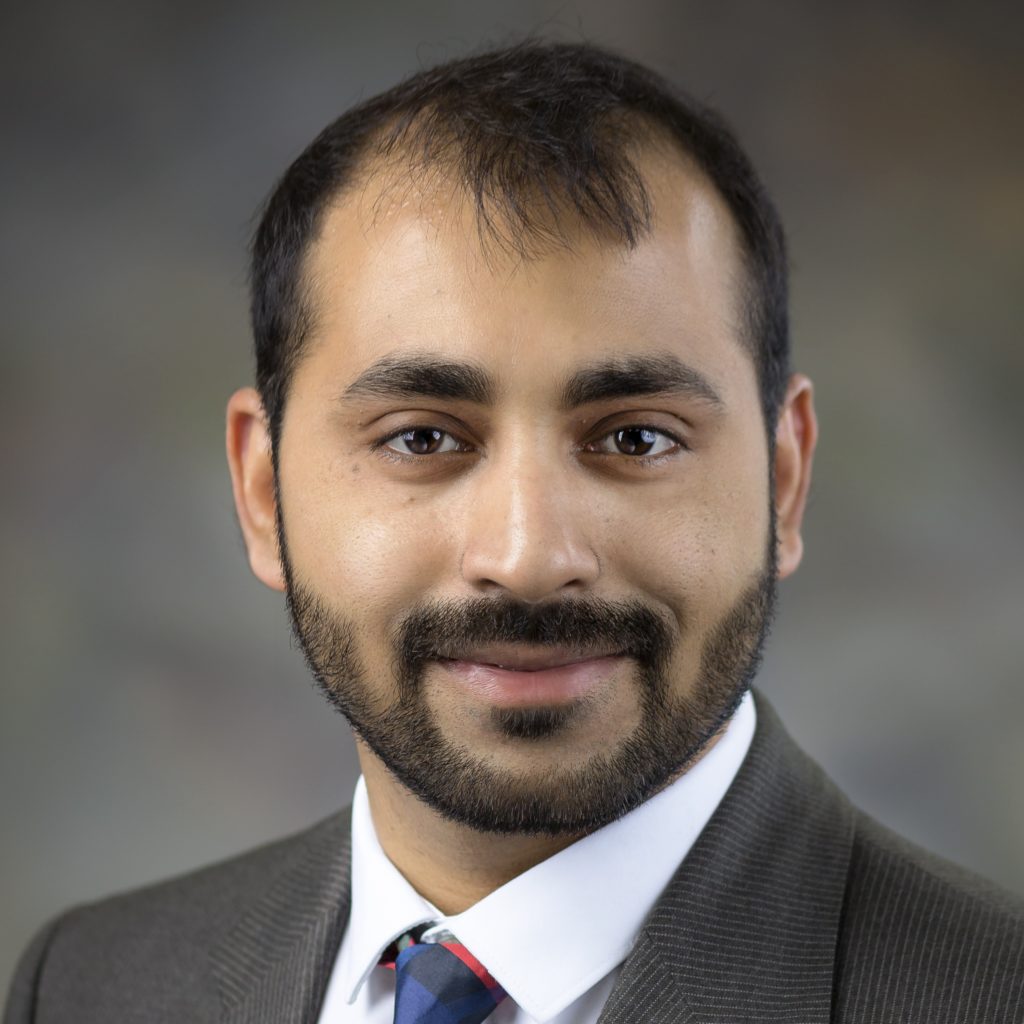America – The land of opportunity or opportunists? The outcry of an international student

You may have heard about the new proposed rule pertaining to changes to the F-1 visa program that may go to effect on Oct. 26 if passed. Here is the link to the information on that topic. The article below assess this rule through critical eyes of an international student.
I am a non-immigrant international F-1 student enrolled in a graduate program specializing in the area of neuroscience. This is my story, and these are my opinions.

Mustafa in the lab
When I first dreamt of studying in the United States back in 2010, the thought of educating myself and conducting research at a U.S. educational institute sent a rumble gushing through my gut. See, I belong to the middle-class income background in India, we had a family business and I had seen two generations working by the sweat of the brow just so that there was bread on the table and a shelter over the head. Rightly so, pursuing higher education in the U.S. personally meant a privilege in all possible ways and forms; an opportunity to encapsulate the dream and morph it into reality. So, in order to pay for my U.S. education, my father decided to sell the house– where he and his five brothers were born and raised, it isn’t too hard to imagine the ephemeral value of this decision my father made. My father told me, and I quote “this will educate you; I’d rather ensure the betterment of your future over things that lay in history.”
In 2013, I landed in Minneapolis, Minnesota to attend graduate school and pursued a master’s in pharmacology at the University of Minnesota, twin cities campus. A new life began which was fresh, exciting, challenging as well as a brutal jolt to the world of adulting. Whether it was school or outside, the learning curves associated with figuring out most things in a foreign land were steep but enjoyable. My experience and time at University of Minnesota were nothing remotely similar to my experiences in India which only motivated me further to get additional research training under the F-1 Optional Practical Training (OPT) program. This research training lead to the interest in pursuing neuroscience here at UT Health San Antonio where I started my Ph.D. training in 2016. My research is trying to understand the neuroimmune and metabolic mechanisms of cognitive impairments that affect over 16 million people in the U.S.1 Research is what I am passionate about and I have strived hard over these past seven years to not just educate myself but also contribute to avenues of scientific research that may benefit the community I have called my home in these past years.
Much like me, there are thousands of other students who have embarked on such higher education journeys. The motivation behind narrating my journey was to shine light on the negative repercussions of the proposed rule to eliminate the duration of status and limiting grace period for staying post-graduation for F-1 students, J-1 scholars2 If passed, this will be the biggest overhaul to the F-1 visa program– that has the potential to directly impact two million people in this country and their families.
As of 2019, there were over a million international students in the U.S.2,3, pursuing college or graduate education and contribute to over 40 billion dollars to the U.S. economy. Currently, all international students under the F-1 program enter on a ‘duration of status’ (D/S) which is to not extend their graduation and post-graduation training. If students do not graduate by the anticipated end date on form I-20, they would need to seek approval from their respective school officers to extend it. The new rule proposes to eliminate D/S and issue an I-94 (immigration entry record) that will expire four years from the program start date and once graduated, a 30 days grace period would be provided for continuing legal stay as compared to 60 days currently4. For countries that are on the U.S. state sponsored terrorism list, the I-94 will expire in two years according to the proposed rule. There are additional provisions under this proposed change that pertain to specific education programs which are not as damaging as these two above.
The enrollment in the United States has remained stagnant over the past two years with trends of declining further due to the changes in the H-1B highly skilled visa categories which recently went under effect. This proposed rule will further discourage the international student community in pursuing higher education and there many good reasons for that. Firstly, the average graduation time for research-intensive Ph.D. programs nationally is an average 5.5 to 6.5 years and this category accounts for 25 percent of all international students pursuing STEM degrees2,7. Moreover, the national four-year college graduation rate is only 33 percent8. Secondly, it should not be forgotten that historically a significant number of international students currently enrolled will be first in their families to receive college education and post-graduate degrees who take longer and require additional resources to facilitate their education. Taken together, the new proposed rule does not take in to account these timelines and may further burden the already limited administrative processing of international student documents for the schools and federal bodies.
The proposed rule couldn’t have come at a worse time when the US economy is flailing amidst the fueling fire of the pandemic and annihilation of public health measures. The current grace period of 60 days post-graduation is already strenuous as post-graduate practical training in their field of study are a critical component of training by design and students rely heavily on it to ensure professional career development while still continuing to advance science, innovation, education, medicine and broadly the economy of this country. Due to poor immigration policies, the demand for such coveted opportunities has grown exponentially over the past two decades but the supply has not kept up pace with the growing needs of international students.
Graduate stipends range between $13k – 34k which are nearly not as competitive to industrial science positions and non-funded students pay a staggering amount of dollars in tuition and fees. The need to file a petition to extend legal stay before graduation by filling form I-539 would cost an additional $370 dollars6 adding to the tremendous financial burden these students face. The current processing times for I-539 applications across various centers in the U.S. is between 4-11 months5 and the proposed new rule will put significant stress on students, various school advisors, officers and USCIS. Amidst the pandemic, the average processing times for optical practical training applications has also gone up from three months to five months;5 it remains to be determined how the surge of additional petitions may affect such processing times if the proposed rule goes in effect.
America, as I know is the land of the free and the land of opportunities. I can say this because I have lived it and enjoyed every bit of it. I have much appreciation and admiration for higher education in the U.S. because the academic community is extremely critical to the progress of this nation. Importantly, this nation has a history of supporting, retaining and accentuating talent that become the next generation of leaders in their respective domains. It should remain so, and this is the time and opportunity to safeguard it. We as international students, and I speak for every student who has abided and respected the law, it is disheartening to learn that we are mere data points that can please certain sections of the community while we battle the unique challenges that will present in the near future and rethink a simple idea as traveling home to visit our families.
This new proposed rule is a rather aggressive tactic in identifying individuals who may have violated their legal status in the U.S. Of close to two million students under the student visa program, only 1.53 percent violated their legal tenure and overstayed.2 While accountability on part of an individual’s action and the need for oversight by federal bodies to deter legal violations seems appropriate, there are certainly better ways that this issue can be resolved without stoking fear and panic in over two million people who not only bring foreign dollars but also positively contribute to the development and betterment of this country. There is a strong and urgent need to remind that the international student community often face social, cultural, financial, legal and mental health challenges with limited resources and support. The new proposed rule will jeopardize the overall well-being of such students and their dependents.
There is a reason why I did not mention my name in the introduction of this opinion, it is because the proposed changes to the F-1 visa program are one step further in the direction of international students being projected as perpetrators hurting national security and interest, a move which is at best misguided and a glaring portrayal to win another brownie point in this geopolitical war on immigration. By all statistics and rubrics of scale, the community of international students represent a national interest and a national asset that has benefitted this nation in numerous ways, culturally, financially, in science, technology and innovation, in medicine and health care just to name a few.
References
- https://www.cdc.gov/aging/pdf/cognitive_impairment/cogImp_poilicy_final.pdf
- https://beta.regulations.gov/document/DHS_FRDOC_0001-1933
- https://educationdata.org/international-student-enrollment-statistics
- https://beta.regulations.gov/document/ICEB-2019-0006-0001
- https://egov.uscis.gov/processing-times/
- https://www.uscis.gov/i-539
- https://www.nsf.gov/statistics/2018/nsf18304/report/what-influences-the-path-to-the-doctorate/time-to-degree.cfm
- https://nces.ed.gov/fastfacts/display.asp?id=40
- https://www.insidehighered.com/news/2018/10/26
About The Author

Mustafa Mithaiwala is a student in the Neuroscience discipline of the Integrated Biomedical Sciences program. He is in the lab of Dr. Jason O’ Connor investigating the neurobiological mechanisms underlying inflammation-induced cognitive impairment using both in vivo and in vitro systems. His current focus is on dendritic remodeling in the hippocampus and the contribution of neurotoxic kynurenine metabolism. Learn more about Mustafa in the article “Mustafa Mithaiwala: Motivation, Character, and Flexibility” >>
The “Beyond The Bench” series features articles written by students and postdoctoral fellows at The University of Texas Health Science Center San Antonio.
